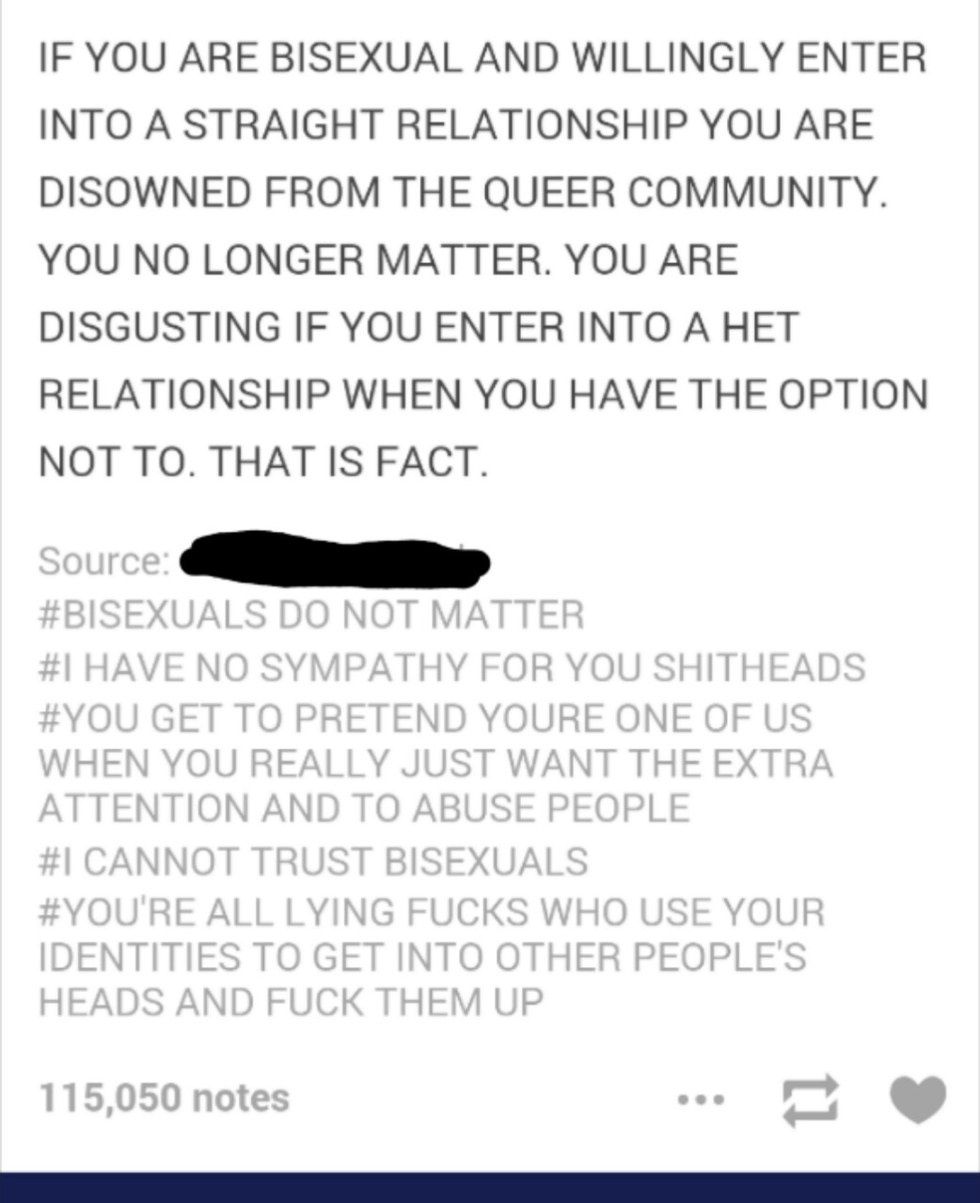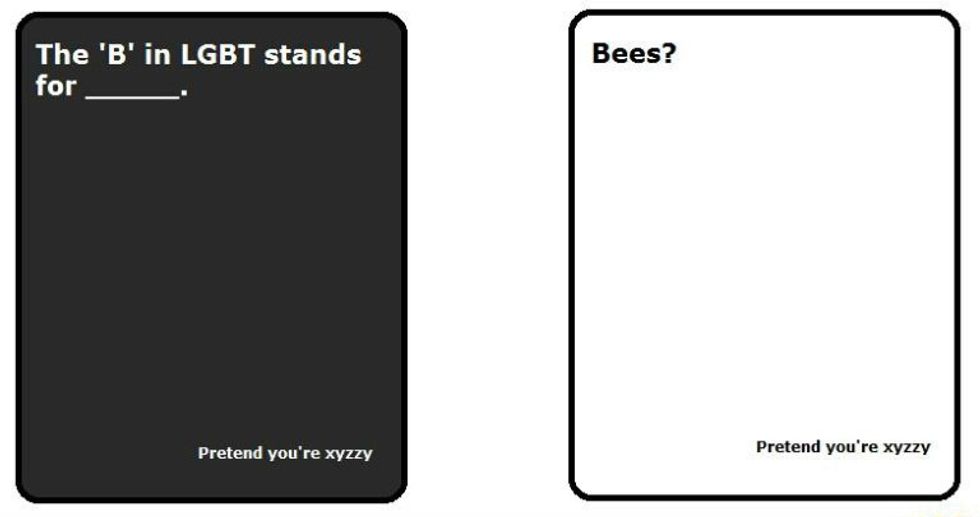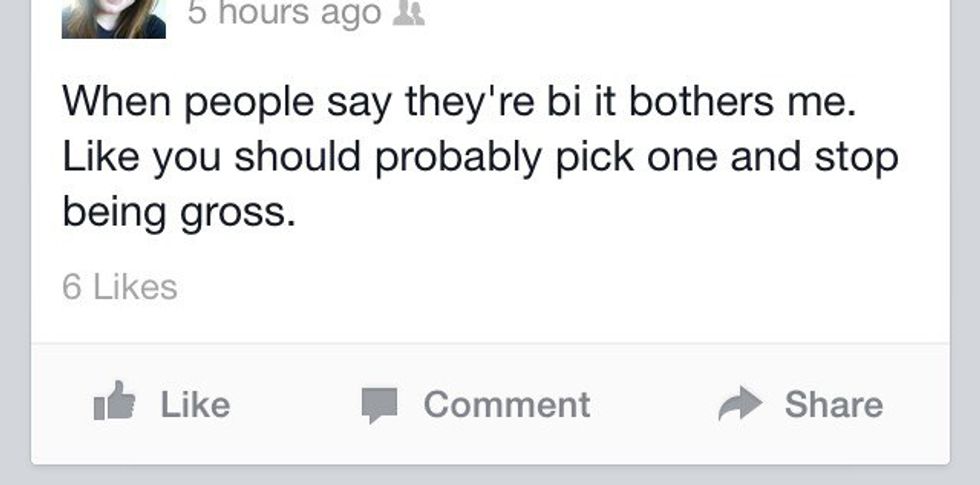The LGBTQ+ community is one that constantly preaches the importance of love and acceptance to straight and cisgender people. However, queer folk, particularly cisgender gays and lesbians, are surprisingly hypocritical in that they are not so accepting of the less mainstream members of the community.
An example of this is the rampant biphobia present within the LGBTQ+ community. Due to the constant presence of bi-erasure by other queer folk, one would think that the B in LGBTQ+ stands for “bees” and not “bisexual.”
As a bisexual woman, I often find myself feeling isolated from both the cisgender heterosexuals and the queer community. Because bisexuals are not seen as “queer enough,” I feel as if I have to justify my queerness in order to be accepted and understood by other LGBTQ+ folk. While I luckily have not yet encountered it at the Claremont Colleges, the majority of biphobia I have seen has been online in the form of hateful social media posts, as seen in this screenshot of a biphobic post from Tumblr:
Gabrielle Garcia, a Scripps College first year, stated:
“I don't believe I personally witnessed [biphobia] in person, but I've definitely seen it online in the LGBTQ+ community on Tumblr. Mainly accusations of bi folk being transphobic, being traitorous to the community if not in a relationship with someone of the same sex, bi women being unfaithful to lesbians/are contaminated because they've been with men, etc.”
Many different negative stereotypes plague bisexual people: bisexuals are unfaithful, bisexuals are transphobic, bisexuals are confused, and bisexuals are excessively promiscuous. Moreover, one of the main reasons why lesbians often dislike bisexual women is that they do not want to be with partners who have been “tainted” by men and penises, an accusation that is inherently transphobic because it does not account for the existence of transgender women.
All of these misconceptions stem from a lack of knowledge about what bisexuality actually entails. Once the false definition based on the gender binary is eliminated, bisexuality is actually the attraction to two or more genders. Bisexuality is a valid identity that exists; asking me if I am confused is no different than if you were to ask a straight or gay person if they were confused about their orientation.
The idea that bisexuals are sluttier is false because identity does not determine or impact promiscuity; that is a characteristic that depends solely on the person themselves. Plus, that concept only promotes slut-shaming and tries to police peoples’ sexualities. Zippy Wilson, a first year at Claremont McKenna College claimed that she felt like her “queer card had been revoked” whenever she dated cisgender men.
Felipe Sant’Anna, another Claremont McKenna first year, added:
“I have felt somewhat isolated in the LGBTQ+ community. Bisexual people tend to be invalidated when facing the same experience as gay people because some assume that they could theoretically just choose to be with someone of the same sex.”
Many queer folk claim that bisexuals have “straight-passing” privilege and that bisexuals stop being queer as soon as they enter a heterosexual relationship. However, no matter what the relationship looks like, we never stop being bisexual.
It’s an identity, not a phase or a state of confusion; it never ends. Unfortunately, experiencing discrimination from both the cisgender heterosexuals and the LGBTQ+ community has resulted in significant mental health issues in bisexual individuals.
In 2010, a large study in the American Journal of Public Health found that bisexual men and women had a higher prevalence of mood and anxiety disorders as compared to gay men, lesbians, and heterosexuals. Nearly 60 percent of bisexual women had a lifetime history of mood disorder, compared to about 45 percent of lesbians and a little over 30 percent of heterosexual women. The double stigma created leaves bisexual people isolated from any of the support networks that cisgender gays and lesbians typically receive.
In order to achieve acceptance from the cisgender straights and the LGBTQ+ community, many bisexual people strive to dispel negative stereotypes and thus abstain from doing anything that could make them seem indecisive, overly sexual, immoral, etc. However, these unrealistic standards end up creating a conflict between the good bisexual and the bad bisexual.
The perfect bisexual is monogamous, faithful, hates threesomes, and is overall a very bland and vanilla human being. The messy bisexual is therefore, polyamorous, promiscuous, kinky and a cheater; basically the image of the negative stereotypes.
But, things like polyamory, promiscuity, and overall sexual preferences are not inherently bad, so the struggle to be the good bisexual over the bad bisexual only promotes intolerance of non-normative lifestyles and furthers slut-shaming. Plus, whether a partner cheats or not is based solely on the individual and the relationship, not bisexuality.
Sidney Butler, an admitted student to Pomona College, said:
“I don't like the policing, like with any minority it only breeds self-hatred. There are bisexuals who fit the stereotype the same way there are people of any group who do, and that's nothing to be ashamed of (as long as you're not hurting or misleading anyone) the issue is when that view becomes the one view of a group of people. I know I've internalized it and taken pride at times in the fact I don't fit the stereotype, but I've also recognized that's extremely toxic. I've drawn parallels to that and growing up trying to not ‘act black’ in order to fit in or be spared rude commentary and that similar to the policing of good bisexual vs. bad bisexual can cause a lot of internalized hatred and create a huge divide within the community.”
Overall, biphobia in the queer community needs to end. How can we expect the cisgender heterosexuals to respect us when we can’t even respect each other?
If we are going to preach love and acceptance, we need to extend that message to queer folk beyond just cisgender gays and lesbians. The LGBTQ+ community needs to be one characterized by love and unity, not hypocrisy. No queer person should have to constantly justify their queerness just to be accepted into their own safe space and support network.
























